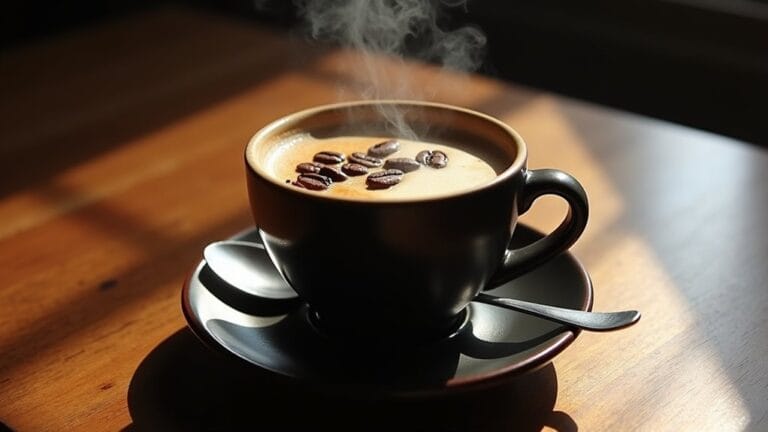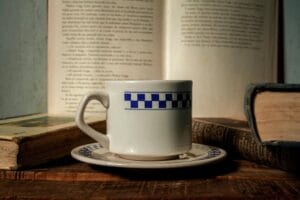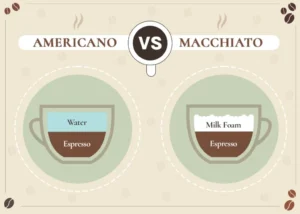What Does Decaffeinated Coffee Actually Mean
Decaf coffee isn’t some magical latte from outer space—it’s just regular coffee beans that had most of their caffeine yanked out before they were roasted and ground, so folks can sip without bouncing off walls.
Coffee minus the caffeine, roasted and ground so you can relax instead of ricochet.
What does decaf coffee mean? It means beans soaked, steamed, or gassed while still green, aiming to drop their buzz but keep flavor, aroma, body, and soul. Swiss Water® process is one solvent-free method that uses only water and activated carbon filters to preserve taste while trimming caffeine.
Decaf is shorthand for “caffeine reduced,” not erased; decaffeinated coffee caffeine content isn’t zero, and that’s why the question does decaf coffee have caffeine gets a quiet nod rather than a no.
The process happens early, before the brown roast, so the cup feels like coffee minus the trampoline effect.
Exact Caffeine Content in Decaf Coffee
So we’ve already heard that the word “decaf” just means “mostly decaf,” but if you’re picky, you’ll want numbers, not feelings, and here they all are! Research from the journal Food Chemistry places decaf brewed coffee near 7 mg of caffeine per 8-ounce serving. Standard brewed gives the exact amount of caffeine in decaf coffee at 7 mg per cup, instant drops to 2.4 mg, and espresso sneaks in 10 mg. Here’s the table:
| Drink | Caffeine |
|---|---|
| Brewed decaf | 3–15 mg |
| Instant decaf | 2.4 mg |
| Decaf espresso | 10 mg |
Thus the decaf coffee caffeine content is tiny, roughly five percent of a normal joe, so fans can count how much caffeine is in decaf coffee and relax.
Factors That Affect Caffeine Levels in Decaf
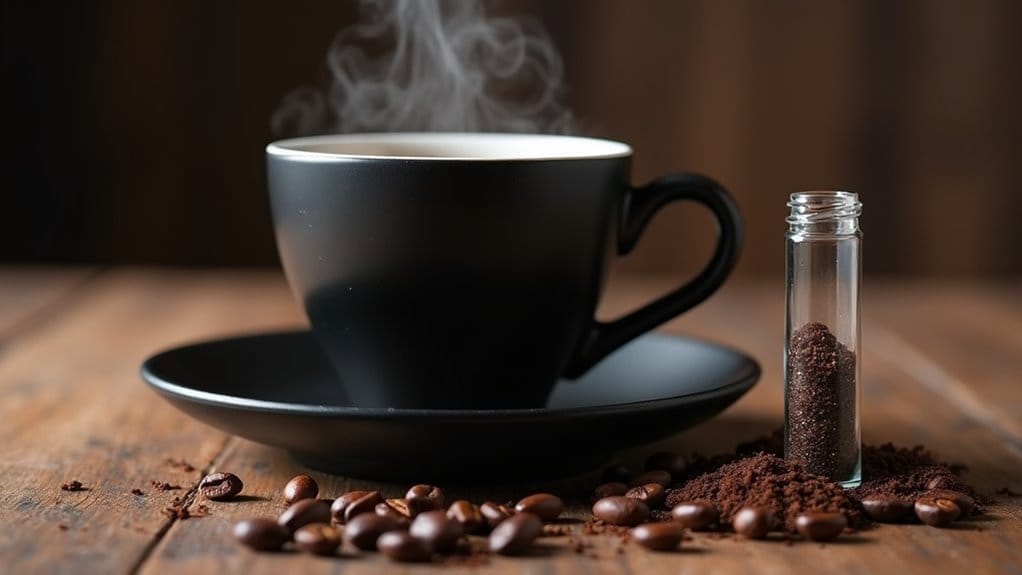
Even though folks call it “decaf,” what ends up in your mug can still bounce around like a hyper squirrel on a trampoline!
Three big things steer the decaf caffeine content:
- The bean initially: Robusta gives nearly double the decaffeinated caffeine content of milder Arabica, so origin equals fate.
- Next, the wash: Swiss Water kicks 97–99 % of caffeine in decaf coffee out the door, while some quick solvent shots leave extra hangers-on.
- Last, how you brew: hotter, longer, finer grinds grab every last bit, so a supersized cold brew could sneak in more buzz than a tiny espresso jolt.
Health Considerations for Decaf Coffee Drinkers
Folks who get jittery from tiny bits of caffeine still feel fine after decaf because it’s almost zero, so hooray for calm hearts and steady hands!
Doctors tell pregnant people to stick with decaf, and anyone skipping caffeine for meds can sip it too without a worry.
Even five big mugs a day barely add up, so go on and enjoy cup after cup without bouncing off the walls!
Effects on Caffeine-Sensitive People
Although decaf coffee sounds like it should have zero jitter juice left inside, it actually sneaks in between 2 and 15 tiny milligrams of caffeine per cup—kind of like finding one last raisin in the bottom of the cereal box—so folks with turbo-sensitive nervous systems might still feel their heart tap-dancing or their brain racing as if it just heard recess bells!
How much caffeine does decaf coffee have? About one-tenth of regular joe, yet does decaf still have caffeine? Yes, a sneaky trace, and in the debate decaf vs caffeine, it’s basically the pocket-sized wimpy cousin.
Sensitive pals may get shaky, tummy ache, or mini panic pings, so sipping smaller cups, checking labels, and stopping at any funny flutter keeps safety paramount!
Pregnancy and Medical Restrictions
While most people think decaf equals zero caffeine, moms-to-be still need to keep an eye on the sneaky two-to-fifteen milligrams hiding in each cup.
Those little drops can add up across the day and nudge the daily 200-milligram limit closer than you might think, so pouring an additional or subsequent cup without counting the fudge in your chocolate bar or the buzz in your soda could tip the scale without anyone noticing until the baby shower is over!
Doctors watch how much caffeine is in decaf, since decaffeinated vs caffeine free means traces stay; consequently, does decaf have caffeine?
Yes, slightly, so high-risk pregnancies may skip it altogether, and everyone else must stack every sip from soup to soda against that 200 mg cap!
Multiple Cups Daily Impact
Knocking back five, six, even seven cups of decaf might sound like a circus trick, but each mug quietly slips only about two to five milligrams of caffeine into the bloodstream.
So the daily total stays lighter than a feather compared to one single regular brew.
When people ask how much caffeine does decaf have, the answer is laughably small.
Yet in the decaf coffee vs regular showdown, even ten cups barely match one standard drip!
Yep, science confirms: decaf delivers almost no buzz, while regular coffee jolts the heart.
Does decaffeinated coffee have caffeine?
A pinch, truly a pinch, but stacking extra mugs won’t wreck sleep, spike blood pressure, or hurl anxiety into orbit.
True Caffeine-Free Coffee Alternatives
Once someone dumps the idea of decaf for good, the world explodes with bold, coffee-fake heroes that bring zero caffeine but still deliver cozy sips, nutty smells, and that “haaah” moment after the initial gulp!
| Base Flavor | Why It Rocks | Quick Fix |
|---|---|---|
| mushroom coffee alternatives | lion’s mane gives dark earthy taste plus brain enhancement, no buzz | stir powder into hot water, done |
| caffeine-free chai teas | all the cinnamon ginger punch, zero tea leaves | steep, add milk, feel fancy |
| herbal coffee substitutes | roasted barley chicory or dandy root copy the nutty bitter kick | brew like coffee, morning ritual saved |
These drinks hug taste buds, trick the brain, and keep sleep safe.
Making the Right Choice for Your Needs
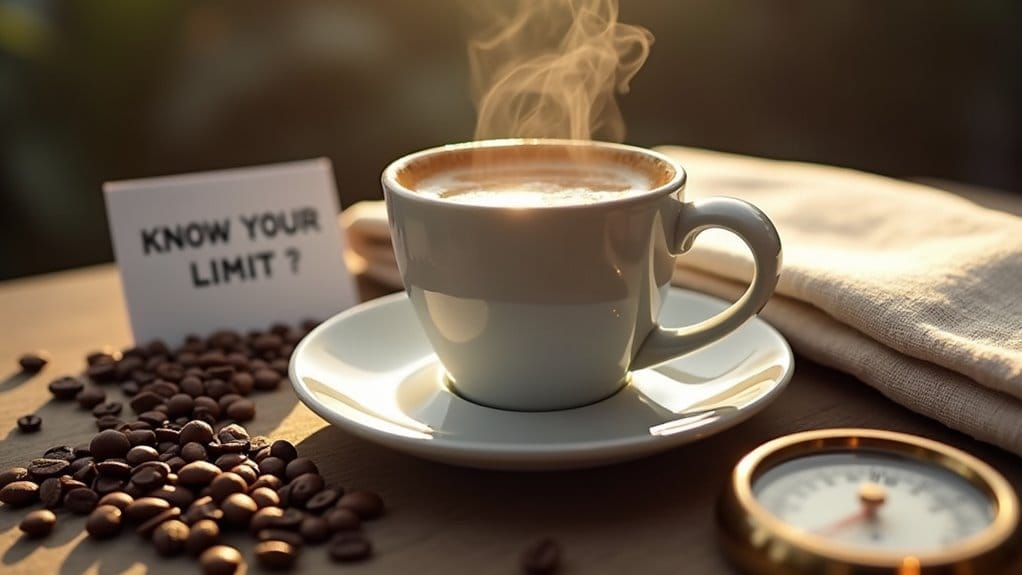
Zero-caffeine drinks are awesome, but some people still want the real coffee smell, so decaf is back in play!
If caffeine in decaf can still sneak 1–15 mg into one sip, smart shoppers check labels that shout “tested for low caffeine”. They ask how much caffeine is in a cup of decaf coffee by their fave brand.
The practical guidance for selecting decaf coffee is easy: pick Swiss Water stuff, pick small cups, and count the cups like candy. A dark roast ounce can hide more zing than a light roast, and espresso, tiny but mighty, may spike 8 mg in one shot.
Sensitive folks measure grams, not ounces, because five cozy mugs can equal one regular jolt.
Frequently Asked Questions
Can Decaf Coffee Cause Anxiety Attacks?
A ripple on a still lake, decaf rarely stirs anxiety attacks; minimal caffeine rarely suffices to trigger physiological responses, though susceptibility and psychological memory may occasionally echo louder than the stimulant itself.
Does Decaf Affect Thyroid Medication Absorption?
Decaf coffee impedes levothyroxine absorption, diminishing efficacy roughly thirty-six percent. Colon stimulation reduces residence time for uptake. Administer water only; delay decaf thirty-sixty minutes.
Is Organic Decaf Safer Than Regular Decaf?
Organic decaf holds safety, regular decaf carries risk; its Swiss Water method removes solvents, their methylene chloride lingers, aligning purity against hazard, guiding preference toward residue-free brew.
Will Decaf Break My Intermittent Fasting?
Decaf’s 5-15 mg caffeine proves insufficient to trigger measurable insulin or glucose changes; fasting generally unbroken. Residual antioxidants negligible; add-ins, not beverage, present potent interruption risks alone.
Are Darker Roasts Lower in Caffeine Naturally?
Current query examines whether roast darkness intrinsically lowers caffeine. Independent assessment concludes no: caffeine molecules endure roasting intact, so darker beans hold comparable caffeine per weight to lighter counterparts naturally.
References
- https://www.britannica.com/story/how-is-coffee-decaffeinated
- https://public-health.uq.edu.au/article/2023/11/how-decaf-coffee-made-and-it-really-caffeine-free
- https://www.healthline.com/nutrition/caffeine-in-decaf
- https://www.caffeineinformer.com/caffeine-content/coffee-decaf-instant
- https://www.swisswater.com/blogs/sw/how-much-caffeine-is-in-decaf
- https://www.aboutcoffee.org/beans/decaf-coffee/
- https://pmc.ncbi.nlm.nih.gov/articles/PMC8228209/

